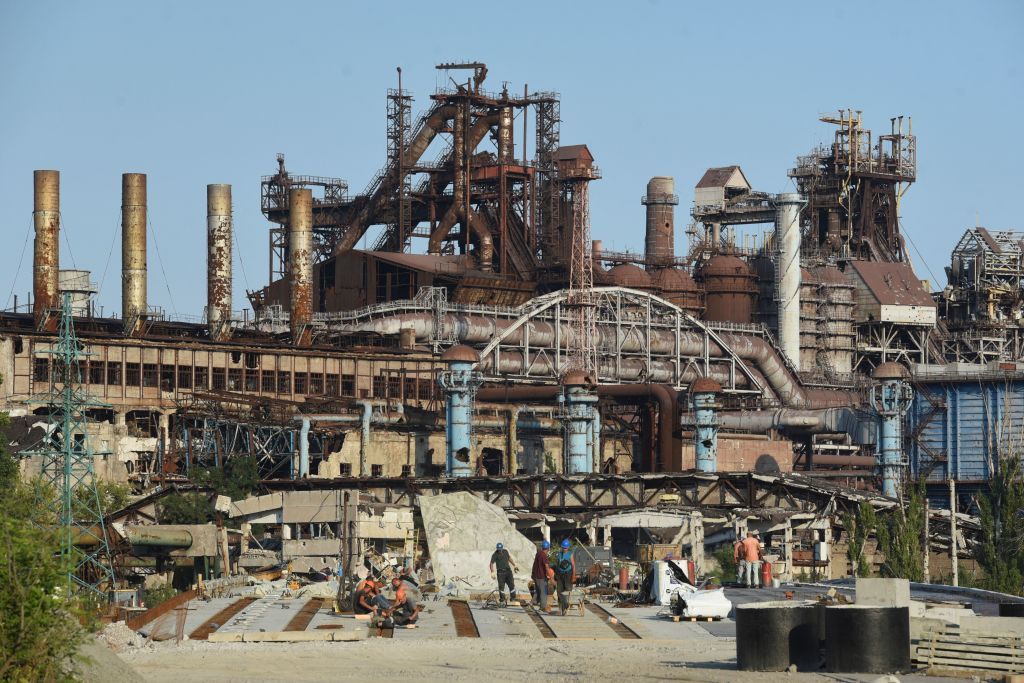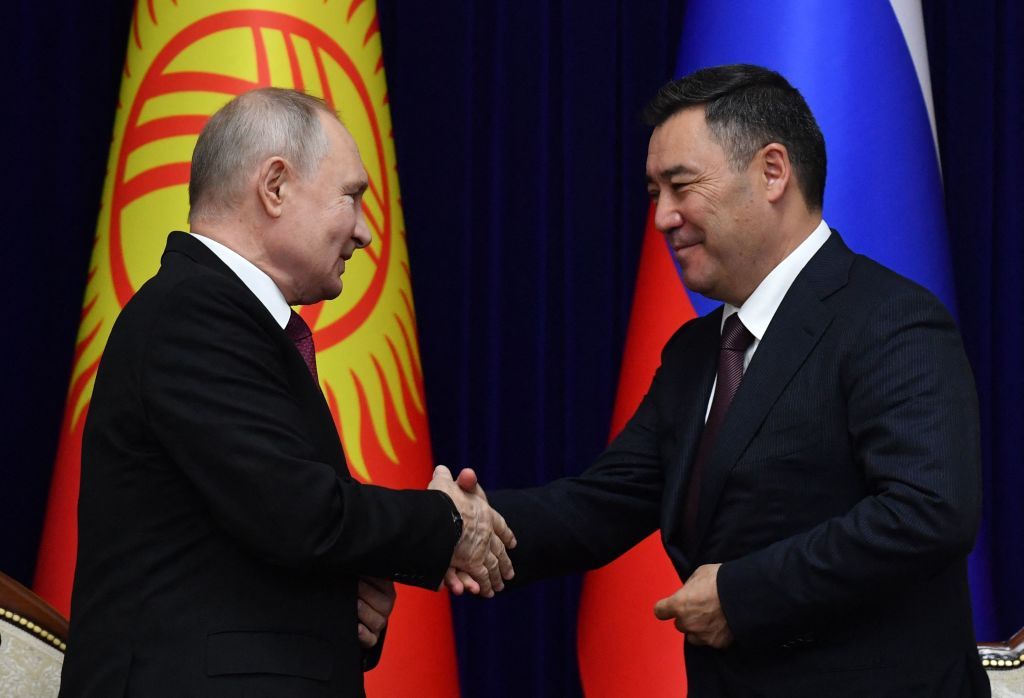Belarus Weekly: Lukashenko's Belarus abducts more Ukrainian children

Belarusian dictator Alexander Lukashenko hosts more abducted Ukrainian children from Russia-occupied territories amid escalating international concern. Ukraine's Commissioner for Human Rights says Russia is seeking to conceal illegal deportations by making transfers through Belarus.
YouTube experienced partial blocking around midnight on Dec. 31 as Belarusian opposition leader Sviatlana Tsikhanouskaya made her New Year's speech.
Belarus' Investigative Committee launches in absentia proceedings on charges of "elections obstruction" against four activists who exposed electoral fraud during the 2020 presidential race.
Belarusian authorities intensify crackdown on private language schools teaching Polish, with police raiding several institutions, shutting down two, and detaining five directors and teachers.
A family of four living near the Ukraine-Belarus border was arrested on charges of treason.
Lukashenko throws holiday event for kids, including abducted from Ukraine
Belarusian dictator Alexander Lukashenko, defying international outrage over his complicity in the kidnappings of Ukrainian children from Russian-controlled Ukrainian territories, has spoken at an annual government-organized event for children – attended by some of the abducted kids.
In his address to the 3,000 attendees, Lukashenko cynically claimed that there were no “alien children” in Belarus.
“There should not be children running away from the war,” he said. “We should embrace these children, bring them to their homes, warm them and make their childhoods happier.”
Lukashenko’s press office reported that there were children from the Russian-occupied parts of Ukraine’s Donetsk and Luhansk oblasts at the New Year’s event, along with Belarusian kids. The children at the event were selected for their academic and artistic talent, and attended along with children from large families, kids with disabilities, and orphans.
Ukraine’s Commissioner for Human Rights, Dmytro Lubinets, told Ukrinform in an interview that the deportation of Ukrainian children through Belarus was becoming systematic, and served to conceal unlawful deportations and make it harder to find the children.
Lubinets alleged that thousands of Ukrainian children might currently be in Belarus but added that the country was likely just a staging point before they were taken to Russia.
The Parliamentary Assembly of the Council of Europe or PACE declared on April 27 that Belarus was complicit in the forced deportation of Ukrainian children, while Ukraine’s Prosecutor General’s Office said on May 23 that it was investigating Belarus’ potential role in the illegal transfer of Ukrainian children in the wake of a report by exiled Belarusian opposition members.
The National Anti-Crisis Management (NAM), a Belarusian opposition organization, said it had submitted evidence to the International Criminal Court or ICC on June 27 revealing Lukashenko’s complicity in kidnapping at least 2,100 Ukrainian children during Russia’s full-scale war.
A recent Yale University Public Health Humanitarian Research Lab study confirmed the NAM’s findings, reporting that over 2,400 Ukrainian children aged 6-17 have been brought to Belarus from occupied Ukrainian regions.
The European Parliament called for an ICC arrest warrant against Lukashenko on July 18.
In December 2023, the International Red Cross suspended the Belarus’ branch of the organization and cut its financing after its Secretary General, Dzmitry Shautsou, confirmed its involvement in the forced transfers. The Belarusian Red Cross dismissed the allegations as “absolutely politicized.”
Despite mounting international pressure, Belarusian authorities and Paralympian athlete Alexei Talai, who was also involved in the forced transfers, pledged to continue the practice.
The latest group of 35 children, abducted from Antratsit, a city in the Russian-occupied part of Ukraine’s Luhansk Oblast, arrived in Belarus on Dec. 22, 2023.

YouTube partially blocked in Belarus during Tsikhanouskaya’s New Year’s address
YouTube was inaccessible in Belarus for 20 minutes around midnight on Dec. 31, exactly the time that Belarusian opposition leader Sviatlana Tsikhanouskaya was delivering her New Year’s speech, Belarusian independent media reported, citing their readers.
According to Euroradio, the first signs of blocking at 11:40 p.m., when the search query “What’s wrong with YouTube” spiked in Belarus. Readers reported that the platform was inaccessible to users of two major telecom operators, with the block likely made at the level of one of the two primary Internet providers in the country. The blocking ended about 5 minutes after the broadcast, which was only reachable in Belarus by using VPN services.
Political analysts linked the blocking with Tsikhanouskaya's address, but also noted that the measure might be revenge for a cyberattack on a major propaganda source – the state-owned agency BelTA – conducted on Dec. 31 by the anti-government Cyberpartisans hacker group.
This is the third time that Tsikhanouskaya, an opposition leader who claims to have beaten Lukashenko in rigged 2020 presidential elections, and who has assumed the role of president-elect in exile, has broadcast a New Year’s message. In the message, she described the fatigue Belarusians are suffering in their struggle, and called for endurance and tenacity in defending their ideals.
Belarus’ Investigative Committee launches in absentia trials against 4 activists for alleged ‘election obstruction’
In absentia criminal trials for “election obstruction” have been launched against Aleksandr Dabravolski, an advisor to Belarusian opposition leader Sviatlana Tsikhanouskaya, and the leaders of three initiatives that exposed the rigging of the 2020 Belarusian presidential elections – Alena Zhyvahlod, Pavel Liber, and Pavel Marynich, the Belarusian Investigative Committee announced on Dec. 28.
The Investigative Committee accuses the activists of hindering "the lawful activities of the Central Commission” without specifying whether this refers to the presidential elections in 2020 or the upcoming 2024 parliamentary elections in Belarus. The charges carry sentences of up to five years of imprisonment.
Dabravolski has linked the case to the 2020 presidential elections: “I see this as an attempt to avenge what happened in 2020, the fact that people rose up not to celebrate the victory of a former president, but to tell him “Go away!” he said.
But Zhyvahlod, the leader of “Chestnye Liudi” (Honest People) initiative, suggested that the investigation is part of preparations for the upcoming 2024 parliamentary elections.
In 2020, the “Chestnye Liudi” (Honest People) initiative encouraged Belarusians to monitor the elections as members of election commissions and independent observers. Independent monitoring was organized at 1,310 polling stations across the country.
The third person charged – media manager and politician Pavel Marynich – led the ZUBR platform for online monitoring of the voting process, which collected in a database 6,774 reports from independent observers of voting irregularities at polling stations.
Holas (the Voice) platform, overseen by the fourth person charged – former tech executive Pavel Liber – asked Belarusians to share their voting ballot with a Telegram chatbot, and kept an alternative registry of over 545,000 ballots at over 5,700 polling stations, helping to prove mathematically that there had been mass-scale vote rigging.
The listed initiatives were instrumental in proving exactly how and at what scale the electoral fraud was carried out in Belarus in 2020. Although the Central Election Committee declared another landslide victory for Belarusian dictator Alexander Lukashenko, the results were not recognized internationally and sparked mass protests, as well as a political crisis that continues to this day.
Belarusian police crackdown on private language schools teaching Polish
Belarusian police have raided several private language schools that teach Polish, shutting down two of them and detaining five directors and teachers in another round of intimidation campaign against the country’s Polish minority and Belarusians seeking refuge in the neighboring state.
On Dec. 21, a Telegram channel affiliated with the Belarusian General Directorate for Combating Organized Crime and Corruption shared a video of five individuals “confessing” to teaching Polish and “helping” Belarusians obtain a “Polish card” – a document affirming the Polish ancestry of an individual, and with which one can enjoy simplified procedures for acquiring Polish citizenship.
Holding this type of document is legal in Belarus. However, state-funded enterprises in Belarus have started requesting employees to tell them if they have Polish cards, and have fired them if they do.
The exiled director of one Polish language school anonymously shared with RFE/RL on Dec. 27 that police had blackmailed the school’s founders, threatening the school’s employees unless the founders shared full lists of the school’s former and current students.
“Most likely, their goal was intimidation,” RFE/RL said. Allegedly, the police suggested that the schools stop their operations or face more raids by “more serious people wearing masks” – a reference to riot police, who typically wear balaclavas.
Two schools were reportedly shut down.
Persecution of Poles in Belarus intensified after Belarusian dictator Alexander Lukashenko claimed that the West, and particularly Poland and Lithuania, were supporting anti-government protests against the rigged presidential elections in Belarus in 2020.

Family arrested in Belarus on charges of high treason
A family of four from a village bordering Ukraine was arrested on charges of high treason on Dec. 28, the local branch of the Viasna Human Rights Center has reported.
Human rights advocates reported that the Prokharau family, father Vasil (54), mother Larysa (48), and their adult children Anastasia (23) and Paval (27) had all been detained. Each of them faces from seven to 15 years of imprisonment.
No further details about the case have been provided.
After investigating, RFE/RL found that the family lives in the village of Hrabauka, 15 kilometers from the Ukrainian border and 17 kilometers from the village of Ziabrauka – where there is a Belarusian air base extensively used by the Russian military.
In January 2023, a resident of Ziabrauka, Yauhen Hlushkou, was sentenced to nine years of imprisonment because a photo of the Ziabrauka airfield and contact details of Ukrainian citizens were found on his phone.
Although Belarus has not joined Russia’s war on Ukraine directly, Lukashenko has put the country’s territory and infrastructure at the disposal of the Russian military. Following the beginning of Russia’s full-scale war against Ukraine, the Belarusian regime started targeting Ukrainian nationals in Belarus.
According to the former Ukrainian ambassador in Belarus, Igor Kizym, as of March 2023, after a sabotage attack on a Russian A-50 early warning and control aircraft, seven Ukrainians were detained by the Belarusian security agency, the KGB, for alleged espionage.













